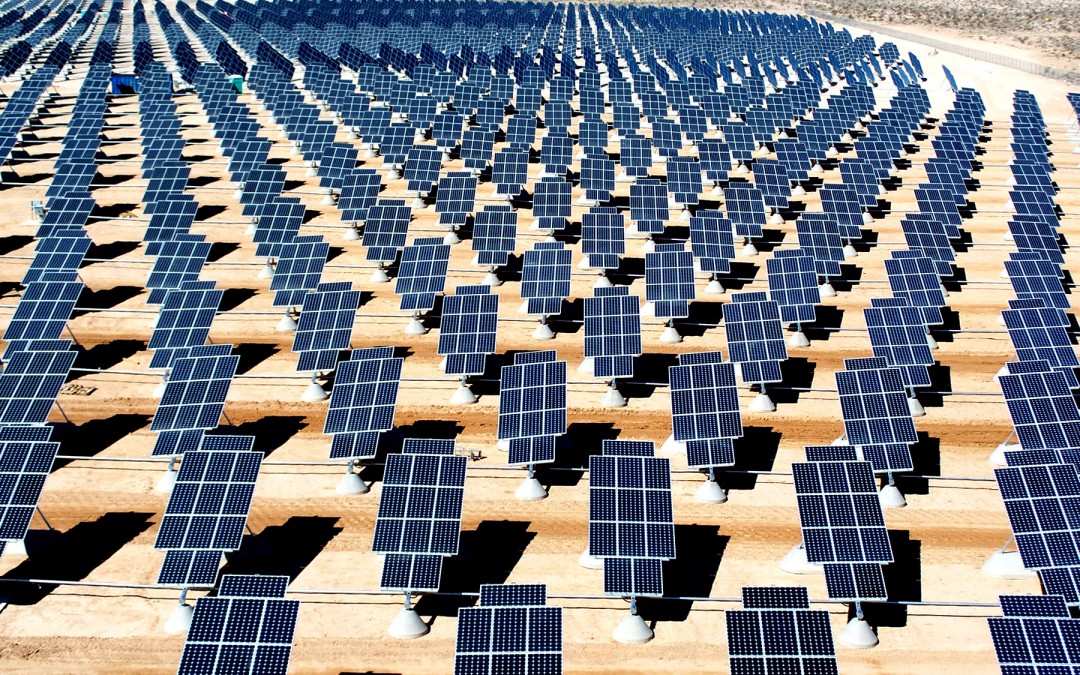
Feb 11, 2015 | Clean Tech, Solar Energy
By Alison van Diggelen, host of Fresh Dialogues
In announcing a massive, unprecedented investment in solar power by a private company, Apple’s Tim Cook said yesterday in San Francisco,
“We know in Apple that climate change is real. The time for talk is passed…The time for action is now.”
Here are three reasons the $850 M solar deal with First Solar makes sense:
1. Money saving: Apple signed a 25 year purchase power agreement which will guarantee the tech company a fixed price for solar power, under the market price for energy in California. Solar prices have declined dramatically in the last 40 years (today’s panels are 100 times cheaper than in 1977) and Apple has timed its agreement to profit from this trend.
“We expect to have a very significant savings because we have a fixed price for the renewable energy, and there’s quite a difference between that price and the price of brown energy,” Cook said.
2. Green Halo Effect: Not only will Apple benefit from a “greener than thou” reputation from their existing fans, but will inevitably attract more environmentally conscious consumers, especially Millennials who care deeply how their tech gadgets and the cloud’s data centers are powered. This will help in its battle with arch rival Samsung which it ridiculed last year in a hard hitting ad campaign.
In addition, in the race to attract and retain the top tech talent in Silicon Valley, Apple’s “green reputation” will be powerful.
The stock market liked this green halo effect and sent shares up almost 2% to history making market cap of over $720B.
“Other Fortune 500 CEOs would be well served to make a study of Tim Cook,” Greenpeace said in a statement.
3. Pioneer for Climate Change: Last year, Tim Cook famously told climate skeptics at an Apple shareholder meeting to “get out of Apple stock” if they don’t like his clean energy strategy. His visible passion on the issue revealed how strongly he feels about climate change and his commitment to reduce Apple’s carbon footprint.
“I want leave the world better than we found it,” said Tim Cook.
Under Cook’s leadership, Apple has forged ahead strongly with plans to get 100% of its energy from renewable sources. A massive data center in North Carolina is powered by huge solar farms and Bloom Energy’s fuel cells. I anticipate that Silicon Valley’s Bloom Energy will also be part of Apple’s new clean power strategy in California (check back soon for updates).
Apple’s trend-setting, clean energy market making reputation is already impacting other tech companies such as Facebook, Microsoft, Yahoo and Amazon, although Google gets the greenest star for its early action and massive investment in clean energy of over $1.5B.
Read more about Apple’s Green Halo and its battle with Samsung (BBC conversation)
How a clever Greenpeace campaign helped green Apple’s iCloud (KQED report)
More clean energy and cleantech stories
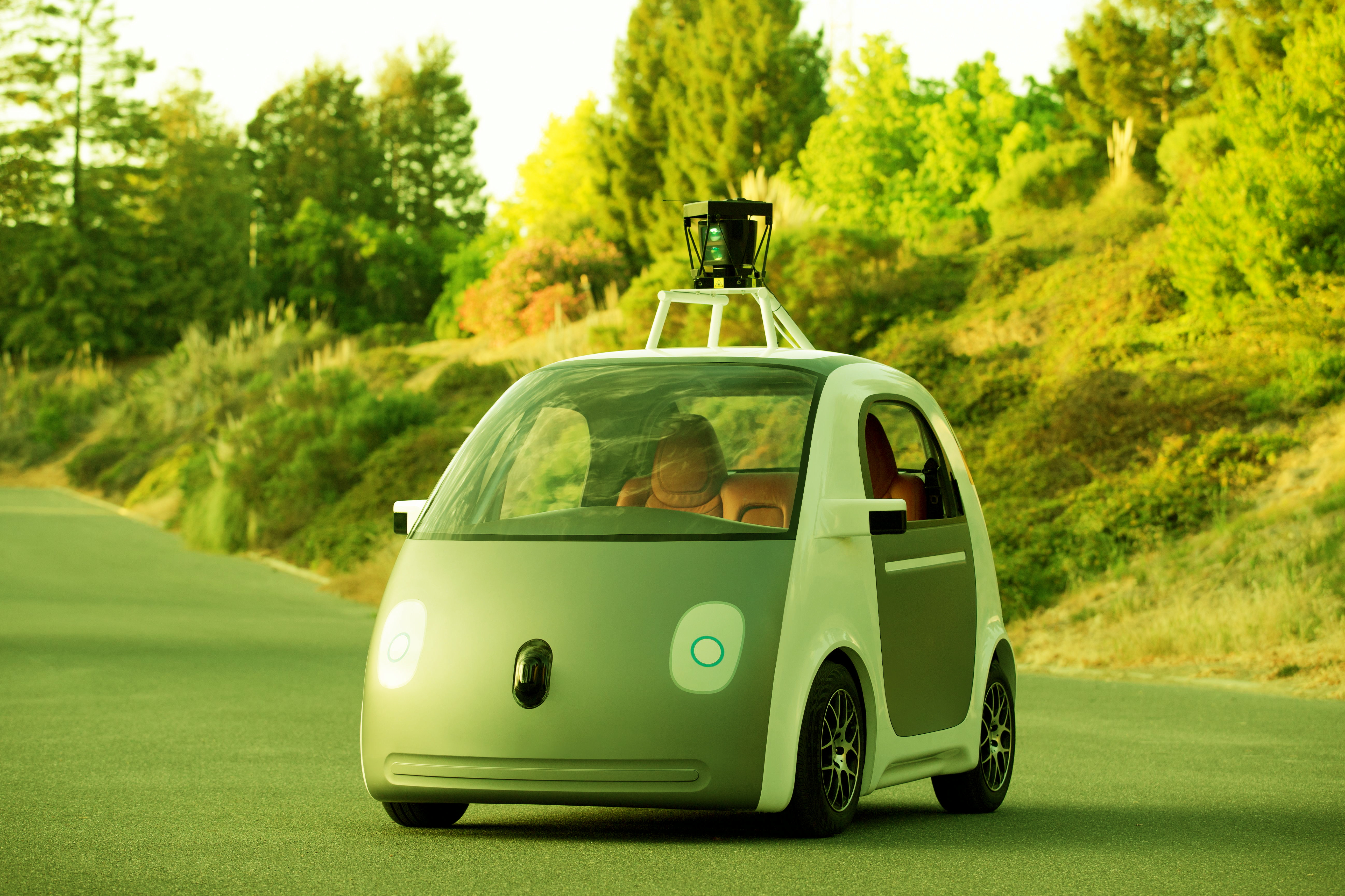
May 29, 2014 | BBC World Service, Electric Vehicles
This week I was invited to be a guest on the BBC’s Business Matters with host Jon Bithrey and The Wall Street Journal’s Alex Frangos. We had a lively conversation about Silicon Valley’s hot stories: The unveiling of Google’s driverless car and Apple’s purchase of Dr. Dre’s Beats Electronics for $3B.
Beyond the obvious detail that Google’s new car is all-electric (which Katie Fehrenbacher points out is important), we explored why driverless cars may one day contribute to a cleaner and more efficient transport sector. Find out how below…
Here’s a transcript of our conversation. It’s been edited for length and clarity. Listen from 18:27 at the BBC World Service.
Bithrey: Google is to start building its own fleet of self driving cars…Let’s bring in our guests, Alison van Diggelen in San Francisco and Alex Frangos in Hong Kong. Alison… have you seen any in your neighborhood…Google trying out their self driving cars?
van Diggelen: I’ve seen many on Highway 85 between Mountain View and San Jose. You see them a lot, but I haven’t seen this particular one. What is unique about this is that it only goes 25 mph and it’s built from the ground up…they’re going to be building about 100 of them and we’ll probably see them in and around Google, they’re going to use it between buildings on their campus. That is the plan.
But what’s exciting about it from my point of view – I cover cleantech – and the beauty of self driving cars is that it can be a more efficient way to transport us. Self driving cars can allow “platooning” so cars can convoy really close together, you can get more cars on the road and it can include car sharing. And here’s an interesting example: in the future, you may be able to rent a car, and you may not want do the autonomous self drive car, but you just call it up on your app and it can deliver itself to your door. And that to me is an interesting, futuristic view of what they one day may be able to do.
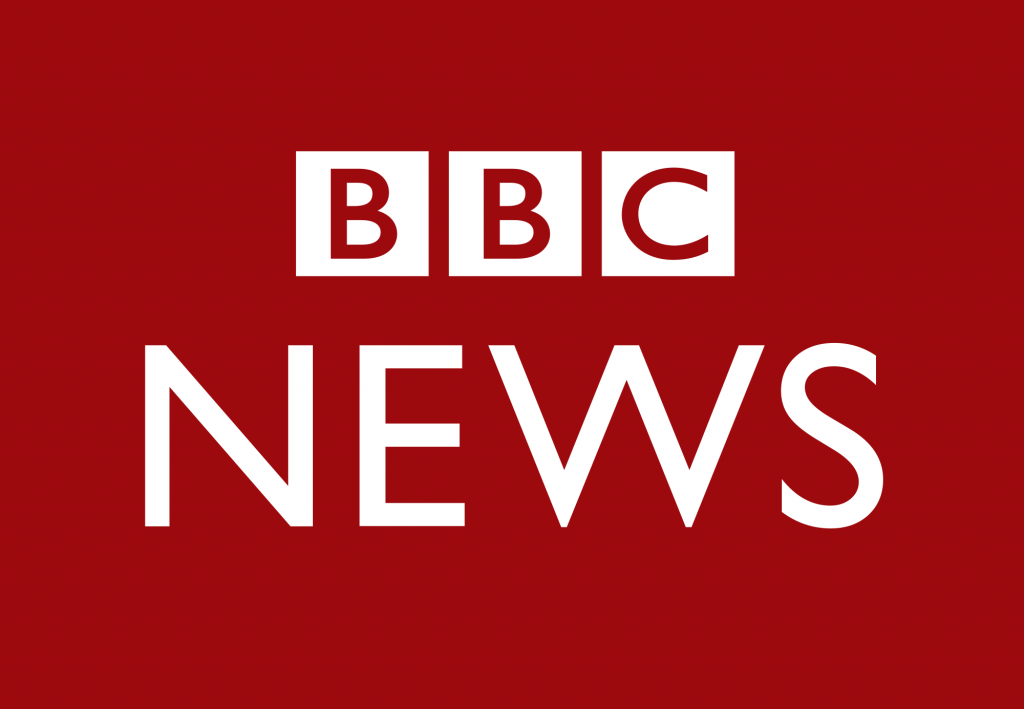 Bithrey: (laughter) It is indeed. There are critics who say that… they could make traffic worse, and urban sprawl worse because people won’t have to drive any more. It will tire them out less if they’re not having to drive themselves, and so they may be happy to make longer journeys in these and thus be more polluting.
Bithrey: (laughter) It is indeed. There are critics who say that… they could make traffic worse, and urban sprawl worse because people won’t have to drive any more. It will tire them out less if they’re not having to drive themselves, and so they may be happy to make longer journeys in these and thus be more polluting.
van Diggelen: Yes, that’s a possibility, however, the interesting thing with this car is that it is an electric car, so again that’s a greener alternative to your internal combustion engine. Another advantage of autonomous cars…is that you can have parking lots where you take your car to the edge of the parking lot and say, “Go Park Yourself.” It will have sensors on the car and in parking spaces, so those cars will be able to pack themselves in much more efficiently, so a more efficient use of available space. I take your point about longer commutes, but there are greener aspects to it too.
Bithrey: Alex Frangos in Hong Kong, is this the type of thing you’d like to try out? Would you trust a driverless car?
Frangos: I’d trust it probably as much as I’d trust all the other crazies who are on the road with me. Saying it’s unsafe is only in comparison to how unsafe it already is on the road, given how terrible drivers can be in various countries of the world. The thing that is, not troubling, but would take the enjoyment out of driving and misses the point, especially in the US of why people drive: the freedom and control it gives people. Or at least a sense of freedom and control to go where they want and do what they want… make a spontaneous turn or what not.
Bithrey: It’s just a more advanced version of cruise control isn’t it?
Frangos: No, I think it’s much more than that because you’re giving up control to the computer. So it could be a great improvement in life, but it would change what driving means, especially to Americans.
Bithrey: Yes, it might be slightly strange just having a stop/go button and not having all the other things we’re used to inside a car. OK, we’ll be back with you both on Business Matters on the BBC World Service….
Want to hear the entire show at the BBC? Listen here
Other topics we cover:
On collaboration: a group of four authors have collaborated on a single novel called “Keeping Mum.” We ask them how it’s possible to keep such a large group focused on a single plot. @26:40
On Maya Angelou: “This will resonate not just for novelists but for business people too. ‘People will forget what you said, people will forget what you did, but people will never forget how you made them feel’ (Maya Angelou)” @39:05
On Apple’s acquisition of Dr Dre’s Beats Electronics. Will it make Apple cooler? @45:56
Find out more about BBC conversations
In April, we discussed Apple’s green strategy (renewable energy supply, recycling iPods etc) on BBC Business Matters
Listen to my other appearances on BBC Business Matters re. how Fresh Dialogues began; the Dalai Lama in Silicon Valley; Scottish independence and much more.
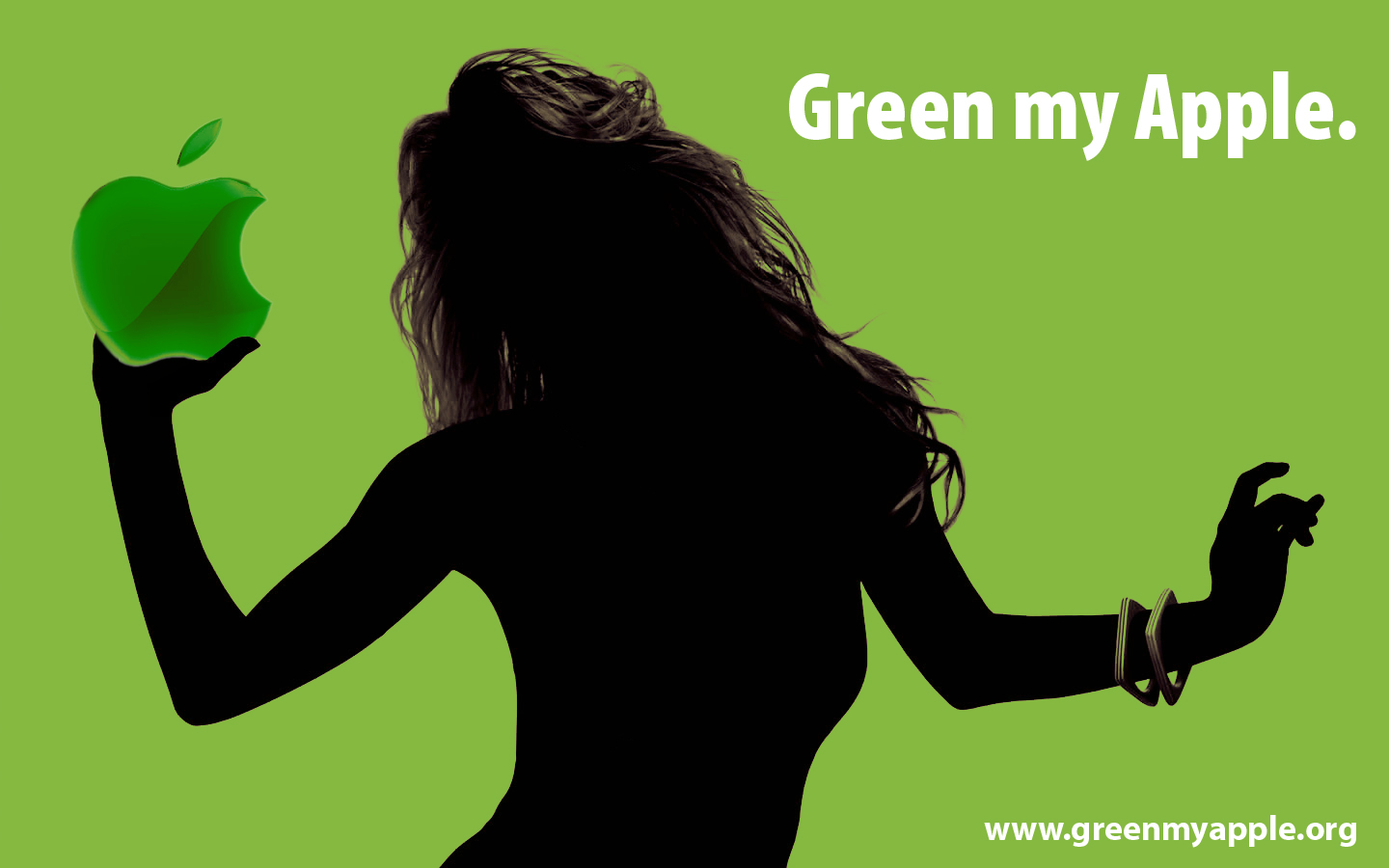
Apr 23, 2014 | BBC World Service, China - what we can learn, Clean Tech, Solar Energy
By Alison van Diggelen, host of Fresh Dialogues
Yesterday, I was invited to join the live BBC World Service show, Business Matters to discuss Apple’s green manifesto and its rivalry with Samsung. I was interviewed by the BBC’s talented Manuela Saragosa. Here’s a transcript of the highlights. Listen to the full interview here (green discussion starts at 26:00).
Saragosa: It was Earth Day on Tuesday… there’s been no dimming of the lights here at the BBC…but technology giant, Apple has been laying out its green manifesto to mark Earth Day. The company’s CEO Tim Cook put out a video, announcing a new scheme that allows any product made by Apple to be returned to the company for recycling.
Our guest, Alison van Diggelen is in California’s Silicon Valley. Alison, green business issues are your thing, what do you make of Apple’s manifesto? Is there substance to it do you think?
van Diggelen: I think there is substance to it. The reason they put out this video is: Greenpeace has been snapping at Apple’s heels for quite some time. I did a story a couple of years ago (for NPR’s KQED Radio) when they were looking at data centers. Greenpeace came up with their own quasi Apple ad (cunningly called iCoal), showing that every time you download something or send a photo on your iPhone, you’re putting more smog into the atmosphere. It was very clever and got Apple’s attention, and now they’re really moving ahead (According to a recent EPA report – Apple is now in the top 10 clean energy users nationally and uses 92% clean energy). One of their major data centers (in North Carolina) where they do Apple iCloud, has 100% green power: clean energy, using solar and fuel cells.
In the video, they’re doing a little chest thumping, saying “Look at us – here’s what we’re doing!” And of course, launching it on the week of Earth Day was a very clever move, a strategic move…
I do think Apple deserves to be lauded. It could do more, but I think shining a light on what it’s doing so far is good.
Saragosa: But it’s come a hugely long way. I know that in 2006, Greenpeace published its first guide to green electronics and at that point it rated Apple among the worst companies (it ranked 11 out of 14 companies). I suppose things have changed quite a lot since then.
van Diggelen: Yes. I think Greenpeace deserves credit for doing what it can to put the pressure on. This report it released went through all the major tech companies: Google, Apple, Facebook, Twitter (Amazon), saying: “Here’s what they’re doing folks!” Companies that you think of as pretty green and green advocates like Google, they’re not doing enough. They could do more.
The interesting thing with Tim Cook that your listeners will definitely be interested in is that at a recent shareholders’ meeting, someone stood up and said: “We don’t like what you’re doing with all those clean energy data centers. Couldn’t you be using your funds to make better products…do other things?”
Saragosa: But is that a widely held view?
van Diggelen: This is the interesting thing: Tim Cook struck back at them. He said: “We believe that we must make the world a better place.” He stood up and said this to the shareholders…”If you don’t agree with it, sell your shares! Which was quite gutsy of him I thought. Since then Richard Branson (CEO Virgin Atlantic etc) has said the same (He recently wrote, “Businesses should never be entirely focused on the bottom line…I would urge climate deniers to get out of our way!“) So I think it’s great to see high profile CEO’s like Tim Cook and Richard Branson are doing that, and saying: Hey! We need to think about the environment, we need to think about our impact on the environment. I’m cheered by that.
Listen to more of our discussion re Apple vs Samsung battle, copycats, tech recycling, and safe disposal of electronic goods.
We also explored attitudes to the environment and clean energy in Asia with David Kuo of the Motley Fool in Singapore; and discussed the devastating levels of pollution in China’s major cities.
van Diggelen: I recently spoke with Andrew Chung, who’s a Chinese American venture capitalist in Silicon Valley. He’s doing a lot of work in China and he was telling me about one of the (green) companies he’s investing in. The impetus in China is huge: they’re having to do it because the pollution is so intense, people are dying from the pollution.
One of these companies that’s completely addressing that is LanzaTech. They’re capturing the carbon monoxide pollution from steelmakers outside Shanghai and using it to create valuable fuel and chemicals, rather than ‘just’ capturing it. It’s a really interesting solution: a win win. A win for the environment, but it’s also a money maker and great for the steelmakers. So that’s the kind of play that’s going on in China.
Read more about Google’s Green Dream at Fresh Dialogues
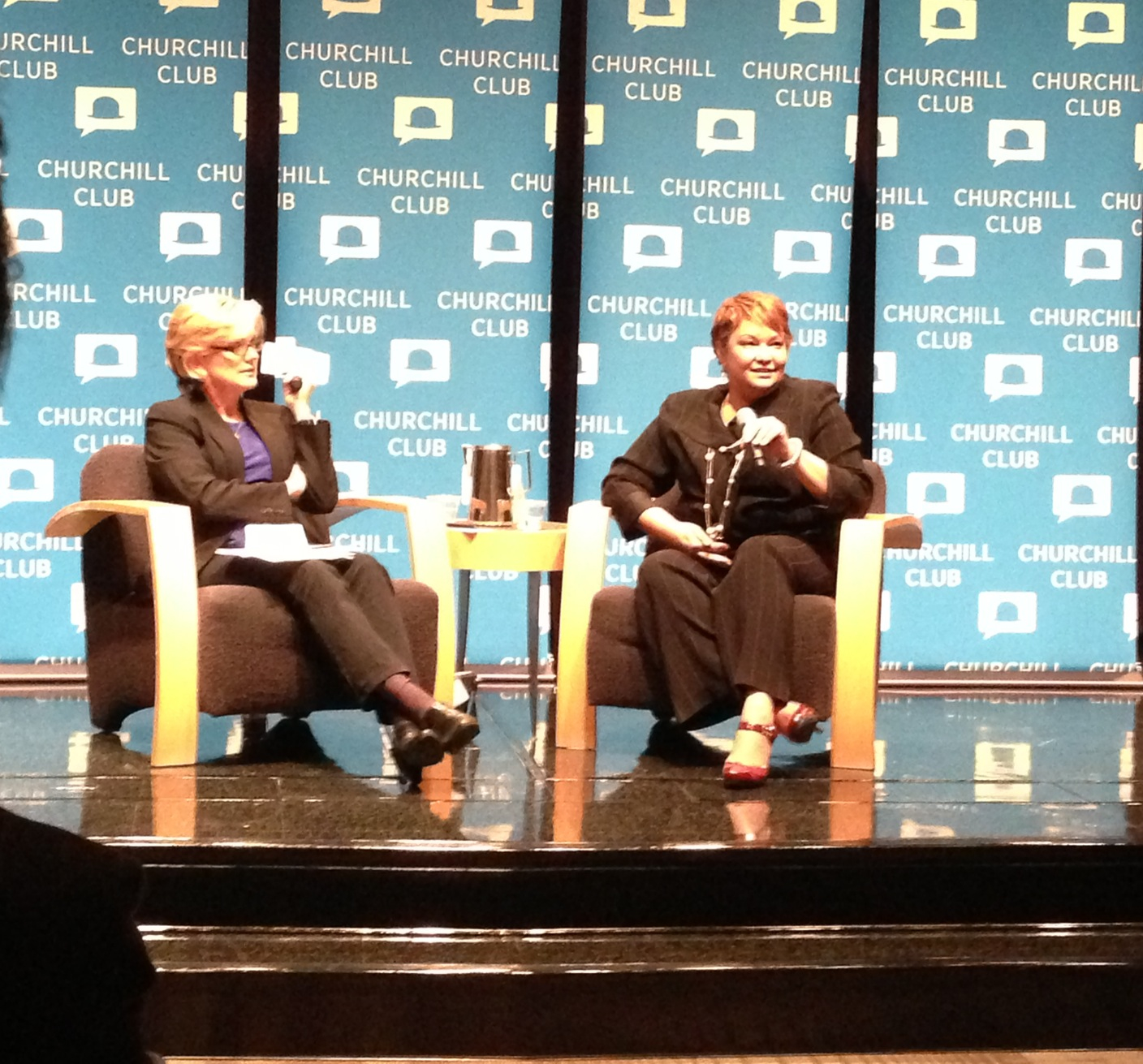
Jan 10, 2013 | Inspiring Women, Policy, Silicon Valley Events
By Alison van Diggelen, host of Fresh Dialogues
Environmental policy was front and center Tuesday evening at the Churchill Club in Silicon Valley as EPA Administrator, Lisa Jackson took the stage with former Michigan Governor, Jennifer Granholm. Fracking and the proposed Keystone pipeline were hot topics during the lively discussion.
In December, Jackson announced that she will leave her post after four tumultuous years in DC and didn’t rule out running for elected office. Speculation is rife about her running for Governor of New Jersey.
On Fracking
“It can and should be done safely..I’m enough of a scientist to say: the verdict is not in yet. We need more data.”
On the Keystone Pipeline
“I will be gone (from the EPA) before a decision is made. A revised environmental impact study will be done, then public feedback, then President Obama will decide ‘if it’s in the national interest’. This will take into account pollution, groundwater, and the economic perspective. It’s too soon in the process to say (if it will get the green light).
A Price on Carbon?
“The current climate doesn’t lead me to believe there will be a national law soon. But that doesn’t preclude state action (such as California’s), and the private sector, where important progress can be made.”
Jennifer Granholm, who was a strong advocate for cleantech during her eight year tenure as Governor of Michigan added, “The Federal Government could offer a pot of money to incentives states to take action and stimulate progress from the bottom up.” She likened her idea to the “Race to the Top” program for education.
On Green Innovation and the Role of the EPA
“The EPA can level the playing field by setting emissions standards and goals which stimulate the private sector to compete and beat them. It often costs less than EPA estimates, due to private sector innovation. But the private sector needs uniform and not patchwork standards…”
“The EPA works for all the American people, not special interests…it’s not a zero sum game. For it to succeed no one needs to lose. There are win/win strategies. Regulations need to be enforced. The work we do is vital and sacred.”
On Science and Climate Change
“I am a scientist and at the EPA we have more scientists than any other Federal agency except NASA…We face a roll-back in the Clean Air Act. Be aware that consensus is enough – unanimity is not required or you’ll miss the window for action.”
There was a vocal climate change skeptic in the audience whom Jackson addressed directly saying he wasn’t representative of the majority of Americans.
On her Greatest Achievements at the EPA
“The endangerment finding made pollution actionable…and we raised fuel efficiency standards.”
As Dana Hull explains in the Mercury News, during Jackson’s tenure, the EPA finalized its endangerment finding which authorizes it to take reasonable efforts to reduce greenhouse gases.
The event was hosted at the Microsoft Campus in Mountain View by Rob Bernard, the company’s green czar.
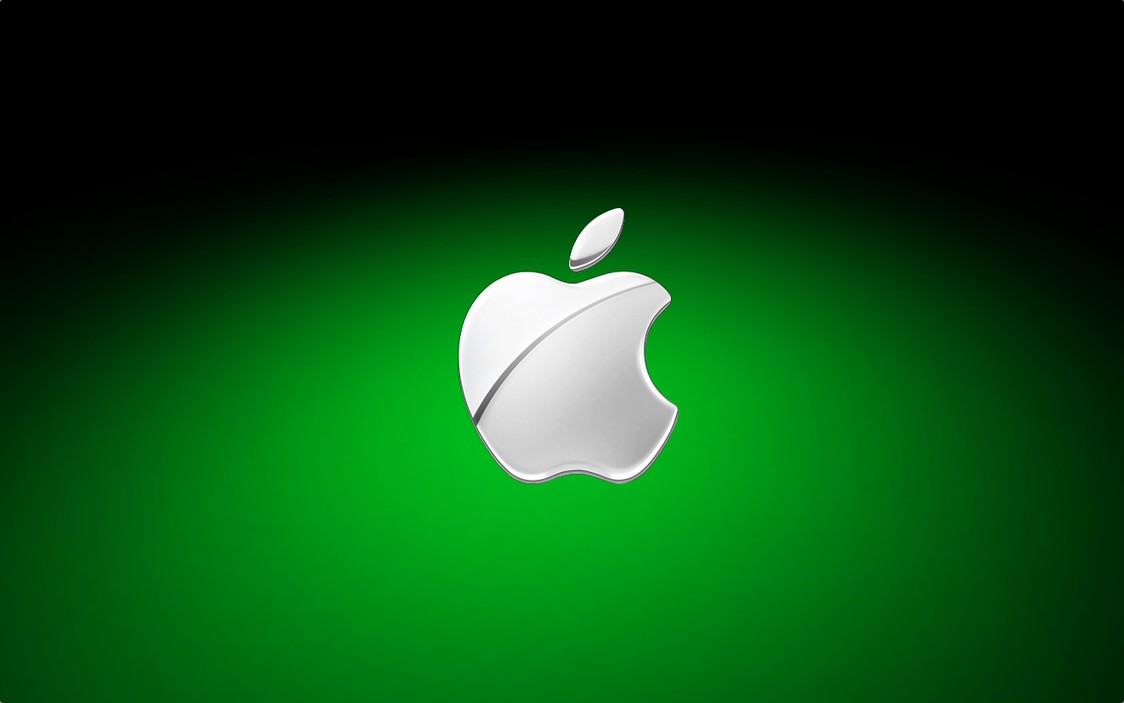
Jun 1, 2012 | Clean Tech, Fuel Cells, Green Building, Solar Energy
By Alison van Diggelen, host of Fresh Dialogues
I recently recorded a story for KQED radio about Apple’s “dirty” iCloud and the more I dug into the issue, the greener the world’s most valuable company appeared to get. By the time I’d finished researching the topic, visiting a local data center, talking with an expert in energy efficiency, and interviewing members of the public at my local Whole Foods store, Apple released a statement announcing it was going “all in.”
“By the end of 2012, we’ll meet the energy needs of our Maiden, North Carolina, data center using entirely renewable sources,” the statement read.
The data center is a LEED Platinum building (the highest rating of the US Green Building Council standards) with an impressive collection of energy efficient design features from a chilled water storage system to a white cool roof which maximizes solar reflection. The whole project looks so “insanely green” it might start to make once green-revered Google turn a shade of (envious) green.
Was it the black balloons released in Apple’s spectacular retail stores in the Bay Area and around the world? The giant iPod “squatting” outside Apple’s Headquarters in Cupertino? The supersize iPhones walking around the campus demanding Apple clean its “dirty” cloud? The slick video or the 200,000+ petitions asking Apple CEO Tim Cook to stop using dirty coal? The environmental group Greenpeace would like to think so.
But it’s likely that none of the above induced Apple to green its cloud. These decisions to install 20 MW of solar arrays (from SunPower) and the largest non-utility fuel cell installation (from Bloom Energy) were years in the making, and the Greenpeace campaign weeks old. But having Greenpeace on its case does appear to have helped Apple discover some transparency in its operations. Something for which it’s not exactly famous. And that transparency will likely spur further clean action from other IT companies.
In a detailed release, Apple explained exactly where the 60% onsite clean energy is coming from and made a public commitment to power the remainder using local and regional clean energy supplies, including NC GreenPower.
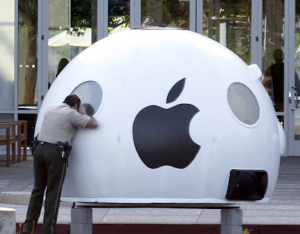
In the war of words and facts between the environmentalist group and Apple, prior to the company coming clean, several commentators accused Greenpeace of “doing a Mike Daisey” on Apple. That is, intentionally fabricating the facts to make a stronger case against the tech giant. In the end, Greenpeace spokesperson Gary Cook told me, “We will continue our campaign to push Apple – and other IT giants like Microsoft and Amazon – to clean the cloud until Apple has policies to ensure that they will grow using exclusively clean energy.”
As for Google and the other fast growing cloud users like Amazon and Microsoft, we’ll be watching closely to see if a “greener than thou” race starts warming up. Each leapfrogging the other to out-green their competitor’s data centers. A race for the most insanely green cloud? Bring it on.



 Bithrey: (laughter) It is indeed. There are critics who say that… they could make traffic worse, and urban sprawl worse because people won’t have to drive any more. It will tire them out less if they’re not having to drive themselves, and so they may be happy to make longer journeys in these and thus be more polluting.
Bithrey: (laughter) It is indeed. There are critics who say that… they could make traffic worse, and urban sprawl worse because people won’t have to drive any more. It will tire them out less if they’re not having to drive themselves, and so they may be happy to make longer journeys in these and thus be more polluting.





